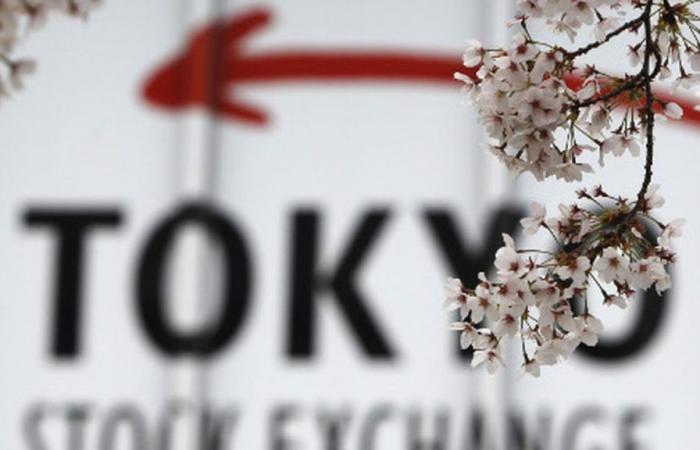LONDON, June 21 (Reuters) – As markets try to determine the pace of central banks’ monetary easing, upcoming inflation data from the United States, Europe and Japan will be closely watched.
In emerging markets like Mexico, Turkey and the Philippines, central bank meetings will dominate.
In France and Great Britain, where early legislative elections are being prepared, the budgetary situation is worrying in Paris, while in London a large victory for Labor is reassuring.
Roundup of the market outlook for the days ahead:
1/ THE UNKNOWN PCE IN THE UNITED STATES
The long-awaited slowdown in American inflation is struggling to take hold, but investors remain hopeful, showing themselves to be more optimistic than the American Federal Reserve (Fed), which only plans one rate cut this year.
The publication next Friday of the personal consumption expenditures price index (PCE), the Fed’s preferred measure of inflation, could reinforce this hope even if caution remains in order as consumer prices (CPI) in the United States showed only stagnation in May, certainly unexpected.
A disappointing PCE figure could weaken the arguments of proponents of an imminent interest rate cut.
2/ THE BOJ MUST CONVINCE
The Bank of Japan (BoJ), whose monetary policy runs counter to that of other major banks due to the deflation the archipelago is experiencing, left the door open to a rate hike in July. However, the markets do not believe in such a decision and assess the probability of a quarter-point increase in the BoJ’s key rates at less than one in three.
This is largely because the central bank has already said it will also implement quantitative tightening next month. The argument put forward by the monetary issuing institute is not to risk disrupting the bond markets.
The BoJ, like other central banks, bases its policy on indicators and these, so far, do not really exert pressure in favor of monetary tightening. Weak consumer spending is of particular concern, and demand-driven inflation has slowed for nine straight months.
Some key macroeconomic data, such as retail sales due on Thursday and consumer prices in Tokyo due on Friday, should provide further clarity to the outlook. The BoJ will also publish on June 24 the “minutes” of its meeting of June 13 and 14.
3/ INFLATION IN THE EURO ZONE UNDER MONITORING
Preliminary data on inflation in several eurozone countries (France, Italy and Spain) for the month of June will be published next Friday before those for the entire currency bloc on July 2. They will provide a first glimpse of price action, a vital statistic for traders trying to anticipate the pace of the European Central Bank’s (ECB) rate cut this year.
The ECB cut rates on June 6, but persistently high inflation and wage demands raise doubts about the number of cuts to come.
Market participants assess the probability of a further fall in the cost of credit by the end of the year at around 64%, compared to almost 80% before the June meeting.
An upward surprise in inflation could further reduce this probability, especially as investors appear nervous on the bond market with the uncertainty linked to the legislative elections in France on June 30 and July 7.
4/ LONDON-PARIS CONTRAST
The political situation in Britain and France presents a remarkable contrast as voters in both countries prepare to go to the polls.
The legislative elections in France are arousing fear in the markets due to a possible victory of the far right or the left alliance, which could result in an increase in spending with the risk of worsening the country’s budgetary situation . The left-wing “New Popular Front” put the cost of its economic program for 2024-2025 at 125 billion euros on Friday.
On the foreign exchange market, the euro recently hit a one-month low and stood at $1.0683 on Friday, down 0.16%. A further drop remains feared in the coming days.
In Great Britain, where legislative elections are scheduled for July 4, the pound sterling, for its part, benefits from the hope of political stability linked to a probable large victory for the Labor Party against the conservatives of outgoing Prime Minister Rishi Sunak. .
The pound sterling has been the best performing currency against the dollar since the start of the year and has reached its highest level in almost two years against the euro.
Ironically, the fear that a Liz Truss-style scenario in France largely explains the mistrust towards the euro. British financial markets were shaken after the presentation of a mini-budget of 45 billion pounds of unfunded tax cuts, which forced the former British Prime Minister to resign in October 2022. The pound then had fell to a record low at the time.
5/ WAITING FOR THE FED
Efforts by many emerging market central banks to steer their monetary easing cycle are being thwarted by the Fed, with the prospect of a U.S. rate cut receding while the dollar strengthens.
Mexico’s central bank is expected to keep rates unchanged next Thursday. However, it faces rising inflation and peso volatility linked to the surprise victory of the ruling party coalition in the June 2 vote, which scared investors.
In the Philippines, central bank officials, meeting the same day, are also expected to leave rates at their current level, the highest in 17 years, after indicating that current restrictive monetary policy is appropriate.
As for Turkey, which converted late to a more orthodox monetary policy, it is expected to maintain its benchmark policy rate at 50%, as central bank officials have said they are still feeling the effects of inflation, which is rising. rose to 75% in May on an annual basis.
(Written by Ira Iosebashvili in New York, Kevin Buckland in Tokyo, Karin Strohecker and Samuel Indyk in London and Yoruk Bahceli in Amsterdam; compiled by Dhara Ranasinghe; infographics by Kripa Jayaram, Pasit Kongkunakornkul, Prinz Magtulis, Vineet Sachdev; French version Claude Chendjou , edited by Blandine Hénault)






